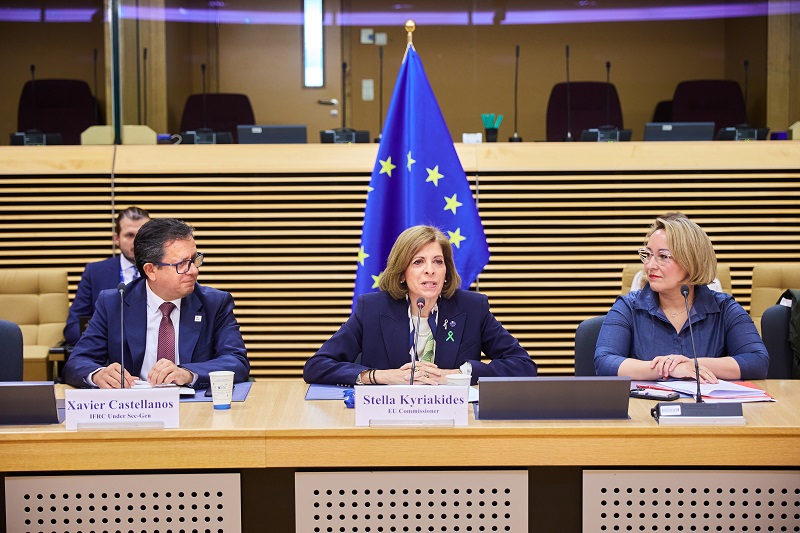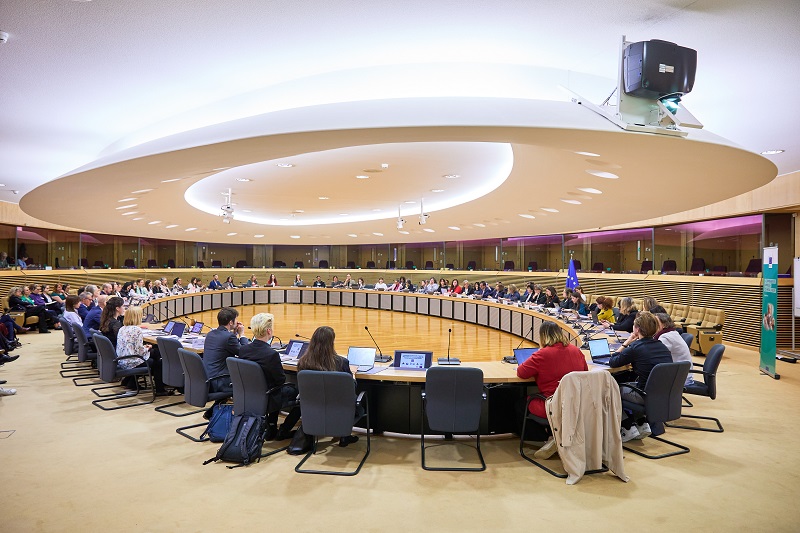Supporting the mental health of people affected by the humanitarian crisis in Ukraine
On 9 April, the International Federation of Red Cross and Red Crescent Societies (IFRC) and the European Commission co-organised an event entitled “Advancing the provision of mental health and psychosocial support to people displaced from Ukraine”. The event was an opportunity to discuss the importance of ensuring early access to mental health services for people impacted by conflict and disasters. It was also a chance to reflect on the first findings of a partnership between the European Commission and the Red Cross that is delivering psychological first aid and psychosocial support to people affected by the humanitarian crisis in Ukraine across 24 European countries. The event was opened by Stella Kyriakides, European Commissioner for Health and Food Safety, who underlined the importance of mental health as a pillar of the European health union.
While the significance of addressing mental health has gained prominence on a global scale in recent years, promoting and enabling psychosocial well-being has always been a top priority for the Red Cross. In particular, armed conflicts, disasters and emergencies can have an immense and durable impact on mental health and psychosocial wellbeing. Families are separated, loved ones are lost, and communities are destroyed, eroding personal coping strategies and social connections that normally support people.
“Across the Red Cross and Red Crescent network, our volunteers help people cope, rebuild their lives, and thrive again in the wake of emergencies. Our community-based volunteers work tirelessly to offer a listening ear, a comforting presence, and evidence-based guidance,” said Xavier Castellanos, IFRC Under Secretary General.

During the first session, panelists exchanged on how imperative placing mental health at the forefront of consistent crisis response across Europe has been in the context of the humanitarian crisis in Ukraine. Early access to mental health and psychosocial support in emergencies saves lives and prevents distress from developing into more severe conditions.
In Ukraine, in the framework of its partnership with the European Commission, the Red Cross has been able to develop the skills of over 4,000 people through training in Psychological First Aid. This includes medical and social workers, rescuers, teachers, and psychologists who are now able to rapidly identify mental health needs, employ communication techniques aimed at reducing stress or anxiety, and refer people to appropriate specialised services.
Isabel de la Mata, Principal Advisor on Health and Crisis management at the European Commission highlighted the importance of initiatives such as the EU Temporary Protection Directive, which has enabled individuals displaced from Ukraine to access national health systems in EU countries. Nevertheless, access to adequate mental health services remains particularly challenging due to multiple barriers, such as language, stigma and access to information. The programme aims to overcome these hurdles and has connected hundreds of thousands of affected people with mental health professionals and Red Cross volunteers who offer mental health and psychosocial support services. Support is offered in Ukrainian and other languages through various platforms, including helplines, mobile outreach and in-person group activities.
During the second session, testimonies from various Red Cross societies underscored the importance of addressing mental health needs comprehensively. From providing psychosocial assistance to children affected by conflict in Bulgaria, to delivering psychoeducational activities for young people in reception classes in Denmark, running call centers with native Ukrainian speakers to ease access to information and services in Romania or training teachers to support displaced students in Croatia – the partnership between the EU and the Red Cross is contributing to building resilience and fostering community support networks. More than two years down the line, the mental health needs of people displaced from Ukraine are evolving. After an emergency phase, people are now enduring enormous stress and uncertainty about their future and whether they will be able to return home.

“Uncertainty about the future is a key concern that is consistently mentioned. It is aggravated by the on-going conflict, the insecurity brought by displacement, the fear of being sent back, the dissolution of family structures. and the temporary nature of the protection directive. Thus, many people are in the state of ‘futurelessness’, shared Ganna Goloktionova, Technical Advisor at IFRC Psychosocial Reference Centre. “Economic and livelihood stressors, like paying the rent, having a job with stable income amd general financial struggles are the everyday worries for many Ukrainians,” she added.
In her closing remarks, the Director of the Red Cross EU Office, Mette Petersen, underlined the importance of continued collaboration, as well as enabling policies and sustainable funding to adequately address growing mental health needs in Europe. By prioritising mental health and investing in early interventions, we can support all individuals and communities affected by humanitarian crises on their path to recovery and resilience.
For media inquiries, please contact Eva Oyón on: eva.oyon@redcross.eu or +32 2 235 09 22

